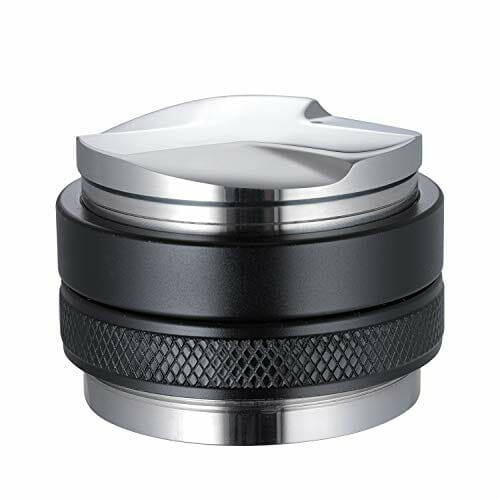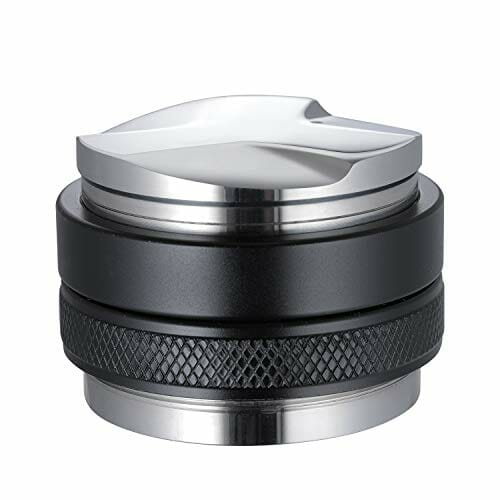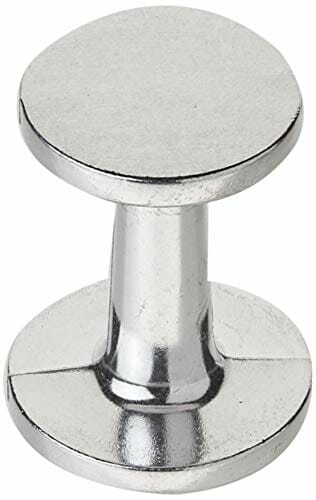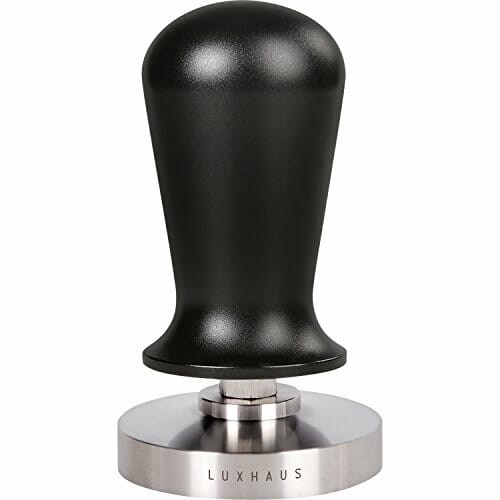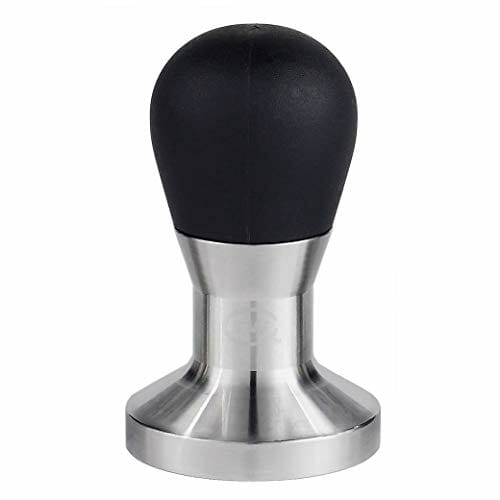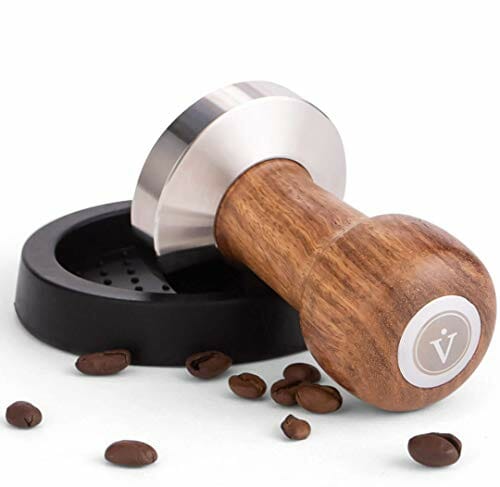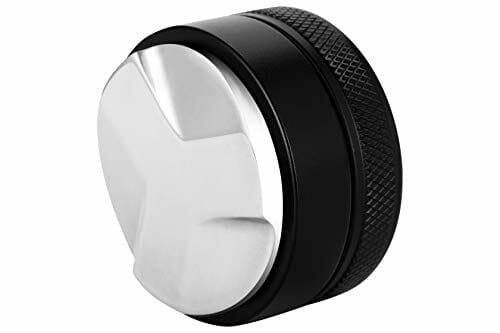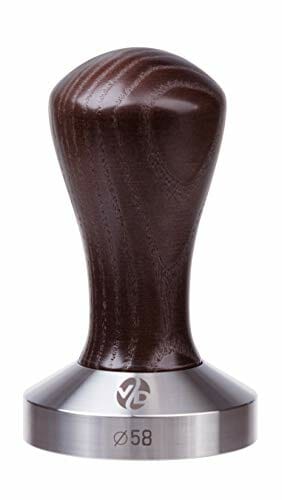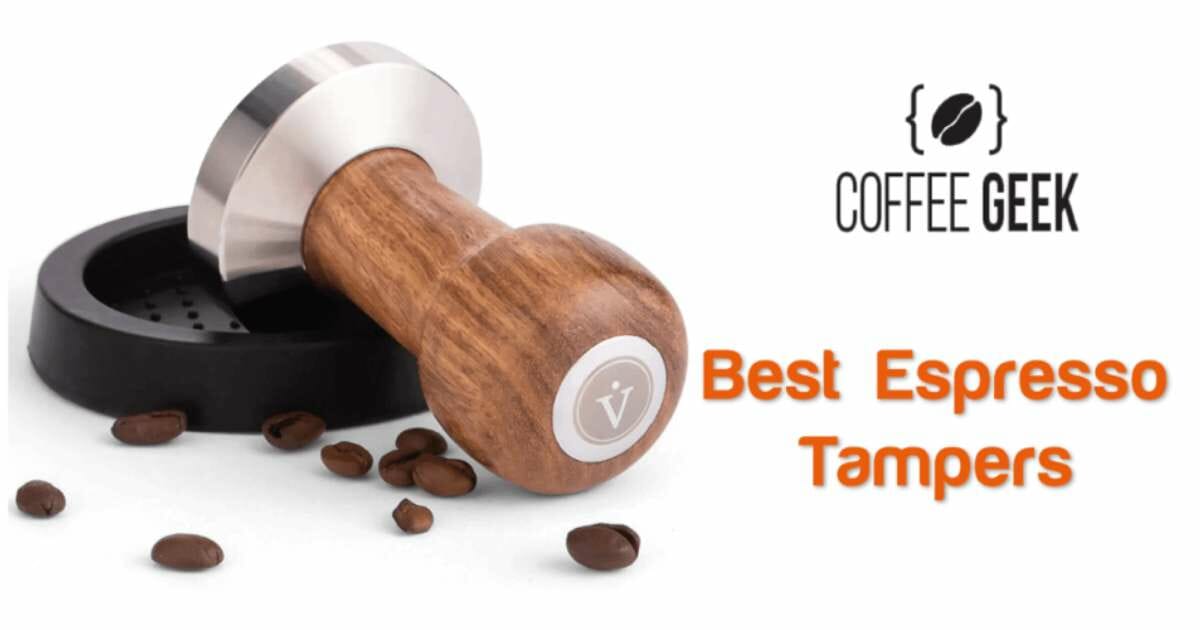
Italians say that to achieve a perfect espresso, you need 5M:
- la miscela – a good blend
- la macchina – a good espresso machine
- il macinino – a good grinder
- la manutenzione – a good maintenance
- la mano – a good technique, including hand temping the coffee grounds.
An even temp is one step towards a great espresso shot. Espresso tampers come in different sizes (49 – 58mm in diameter), shapes, styles, and materials. They can cost less than 10 dollars or their price can be the same as of low-budget home espresso makers.
In this article, we rate for you the best espresso tampers according to our top 7 picks. There’s something vital you should know when picking the tamper to suit you and the differences between them, but we’ll cover that later.
Best Espresso Tampers – Comparison of all Reviewed Products
| Tamper | Product | Features | Price |
|---|---|---|---|
Editor's Choice  |
| VIEW CURRENT PRICE | |
 |
| VIEW CURRENT PRICE | |
 |
| VIEW CURRENT PRICE | |
 |
| VIEW CURRENT PRICE | |
 |
| VIEW CURRENT PRICE | |
 |
| VIEW CURRENT PRICE | |
 |
| VIEW CURRENT PRICE |
What is a coffee tamper and how to use it?
A coffee tamper or an espresso tamper is a stamp-looking device, that tamps the coffee grounds into the portafilter (basket) of the coffee machine, so they are more compact and flat.
Why is this important? If you do not tamp your grounds enough, water will flow too fast and you will get a “watered down” espresso. On the other hand, if you overdo it, water will not make it through the grounds.
Shortly: bad or uneven tamp can result in a bad shot of espresso because you did no pull enough flavors out. Can you tamp espresso without a tamper? Yes, just like you can make espresso without an espresso machine.
You can use a shot glass or pestle but I highly recommend looking into buying a tamper for the best possible results.
Why? The ideal pressure to tamp the grounds is 20-30 pounds. A calibrated tamper is set up for 30 pounds of pressure, with other tampers the pressure is on you, pun intended.
However, most professional baristas say, that the most important things are:
- Have the right size of coffee tamper
- Measure your coffee before you put it in the portafilter
- Push off any excess grounds and make sure the coffee is even. This is called “grooming” and it prevents uneven extraction and pooling.
- Before applying pressure, put the portafilter on a flat surface, bend your elbow but keep your wrist straight and hold the espresso tamper like a doorknob, with your index finger and thumb on the base
- Start forming the puck by applying 15 pounds of pressure. Be consistent.
- Once it is shaped, push harder (20-30 pounds), again, in a consistent way.
- Use twisting motion when pulling up – it is called “tamp stamp” or “polishing”
- Wipe of grounds around the edges of the portafilter (some tampers come with brushes, which I love!)
- Brew and taste the espresso and keep practicing in order to make the best shot of espresso :)
- And of course, always clean the machine, portafilter, and tamper after use.
Sizes, shapes, styles, and materials of tampers
Espresso tampers come in different sizes and shapes. The most popular size is 58mm, followed by 49mm, and 53mm. However, always pick one that is slightly smaller than your portafilter (inside diameter of it)
These are the recommended sizes for some of the most popular brands of espresso machines:
| Espresso Machine Name | Size |
|---|---|
| Breville Barista Express | 53mm |
| Breville 800series | 51mm |
| Breville Dual Boiler | 58mm |
| Gaggia Classic (semi-automathic) | 58mm |
| Krups | 49-52mm |
| DeLonghi older models | 49mm |
| DeLonghi new models | 51mm |
| La Spaziale | 53mm |
| Starbucks Barista | 52 or 53mm |
| San Marco | 53-55mm |
| La Pavoni | 56-58mm |
The most popular espresso tamper shapes and styles are:
- Adjustable dynamometric pressure tamper – Applied pressure is the same each time you prepare your espresso, which eliminates inconsistencies. Good for beginners.
- Calibrated tamper – Thanks to a built-in mechanism, a calibrated tamper applies exactly 30 pounds of pressure to the coffee grounds. Some tampers are calibrated by the manufacturer, but some do require re-calibrating. Overall, calibrated tampers are great for beginners, as well, but more expensive.
- Convex (also called domed) bottom – The most common coffee tamper, along with flat tamper. The difference? Convex has a rounder bottom and point in the middle of the base.
- Ripple bottom – Funny term, but it is true to its name: it creates a coffee bed where water flows in concentric circles.
- Flat bottom – The most common espresso tamper, along with convex.
- Leveler/Distributor – More expensive, but you get a more even and level distribution of grounds in the portafilter.
- Dual-head – Reminds me of dumbells. It has two flat ends, one smaller and one bigger. Great if you have two machines.
- Puck – It looks like a flat hockey puck and has a smaller handle. Many professional baristas go for this type, as it delivers level, consistent results.
- Palm tamper – Similar to puck tamper but you push with your palm. These tampers are gaining popularity lately.
There are videos of the effects of different tamper bases on extraction and the final product online. Personally, my favorites are flat bottom tampers and calibrated tampers.
How To Pick The Best Espresso Tamper For You
Flat vs convex shape – The main difference is, that with a convex one, your temp will not be as even as when using an espresso tamper with a flat base.
However, some baristas claim that with a convex tamper you eliminate the chance of water channeling (water flowing too fast through the portafilter)
Size of base – If you are not sure, check the manual of your espresso machine or contact customer service. You can also measure the internal diameter of the coffee filter.
If you measure in inches, multiply the reading by 25.4 to get the result in millimeters. Always buy a tamper that is a minimum 0.75mm smaller than your portafilter (basket)
Weight – Some users prefer lighter ones, some heavier. Pick the one that feels best for you.
Design – It is important that the handle feels good in your hand, and for some, it is important that the espresso tamper also looks nice. Up to you if you prefer natural wood or metal coffee tamper. Some tampers also come with a silicone mat and a storage bag.
PS: Some automatic/semiautomatic espresso machines already come with espresso tampers, for example, Breville Barista Express, which is my personal favorite.
Other useful barista tools
If you want to take your espresso-making seriously, apart from tampers, you can look into getting:

- A grooming tool, for example Mahlgut Dozer, that redistributes and levels the grounds in the basket before the actual tamping. It is a pricier tool, mostly used by PRO baristas.
- Cleaning brushes, for example, JoeFrex brand
- Cleaning cloths from microfibre or more ecological: bamboo fiber
- Knock boxes, that remove the coffee puck from the portafilter
- Tamping mats, again from JoeFrex or Motta
Best Espresso Tampers
1. 53mm Coffee Distributor & Tamper, MATOW Dual Head
This 53mm espresso tamper is designed for Breville, for example, Barista Express, Pro, Touch, and Bambino.
Many users claim that it is better than the tamper that comes with the machine! It is a dual head- distributor/leveler type of espresso tamper, that fits 54mm portafilter and provides its users with a consistent brew thanks to leveling the surface and evenly distributed grounds.
It also has an elegant black design and looks very durable. This is a 53mm version, but there is also a 58mm one on the market.
2. RSVP International (TAM) Dual Sided Coffee Espresso Tamper
If you RSVP to this offer, you will get an alloy espresso tamper of a dual head type.
One tamping side measures 51mm, the other 58mm.
It looks very nice, feels nice and heavy (but not too much), and is easy to clean.
A good buy, whether you are a pro or a beginner.
3. LuxHaus 53mm Calibrated Espresso Tamper
This espresso tamper with a food-safe stainless steel base claims to not leave metal pieces in your coffee grounds, not to rust, plus it is calibrated for 29-35 pounds, so it makes the job easier.
It fits 54mm portafilter, such as Breville Barista. The manufacturer also claims a 100% return of the money in case you are not satisfied.
LuxHaus calibrated stainless steel tampers are available in 2 more sizes.
4. Rattleware 58-Millimeter Round-Handled Tamper
Another tamper with a stainless steel base but with a bigger diameter, 58mm and fits Gaggia Classic espresso machine, for example.
Users love its simple look and consistent results. Good value for money.
5. VIENESSO Barista Tamper Set (58 mm)
I, personally, adore the look of this espresso tamper: the ergonomic handle is made out of wood and the base is stainless steel.
The stainless steel base can be unscrewed, which makes cleaning easier. It is compatible with De’Longhi Dedica, Rancilio Sylvia, Sage, or Beem espresso machines, but it is always good to measure your portafilter before you click “add to basket”.
Unlike other espresso tampers on this list, Vienesso comes with a tamper silicone mat, that catches leftover grounds.
6. Apexstone 53 mm Coffee Distributor
This espresso tamper is similar to the first one from our list.
Again, it is a 53mm stainless steel base distributor that can be used with Breville 54 mm portafilter basket.
It is heavy, easy to use, and looks very nice.
7 Espresso Tamper – 58mm Tamper – Coffee Tamper Classic Series
This one is similar to the Vienesso tamper: it has a wooden ergonomic handle and stainless steel flat base.
This tamper is well-made and heavy, but still 100g lighter than the previous tamper from our list.
To summarize it, to make a good home espresso, you need fresh coffee beans, a scale, a coffee grinder, and an espresso machine. And even if some of them come with an espresso tamper, it is a good idea to invest in one, either completely made from stainless steel and alloy, or with a decorative wooden handle.

